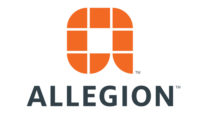Allegion U.S., a provider of security products and solutions, recently worked with the University of Tennessee, Knoxville, one of the early adopters of the Allegion and CBORD mobile access solution, to successfully implement mobile student IDs on iPhone and Apple Watch. The mobile credential solution helped improve operational efficiencies and provided students with contactless access and a convenient transaction experience.
“Campuses staying connected with their students through an iPhone or Apple Watch has become the new normal for convenience and security purposes,” said Jeff Koziol, Allegion business developer manager, campus market.
The university students had requested campus cards on mobile devices through the Student Government Association. Recognizing this student body almost always has their phones with them as they move about campus, the University of Tennessee, worked closely with Allegion, CBORD and Apple to introduce a seamless mobile access solution to its campus. From contactless access at buildings like resident halls or the library, to making payments on and around campus, students and faculty have benefited from the enhanced convenience and security mobile student IDs provide.
A valuable but often overlooked benefit of mobile IDs is remote credential management. Traditionally, new student orientations would take place on campus during the summer months, at which students would receive their VolCards. As the COVID-19 pandemic forced the university to cancel in-person orientations, they instead were able to remotely issue the mobile student IDs.
Mobile student IDs are protected by two-factor authentication to ensure only the student can access their own account, even if someone else knows their password, and can be remotely deactivated by the student or university. If a student misplaces their iPhone or Apple Watch, they can use the Find My app to immediately lock their device and help locate it. Additionally, students and faculty gain peace of mind knowing that they can come back to a campus that has contactless transactions as they can avoid touching keypads or readers and passing their card to someone else. It’s both convenient and more hygienic.
“As an institution that values innovation, it's important to us that we are always adapting to the way students use technology to enhance the campus experience," said Chris Cimino, senior vice chancellor for finance and administration. "Being able to access your VolCard on your iPhone or Apple Watch is one of the many ways UT is continuously improving to meet expectations for a modern campus.”
By leveraging Allegion and CBORD’s solution with DESFire, The University of Tennessee could take advantage of an open architecture and work with various manufacturers without being locked into a siloed proprietary solution.
The university upgraded from an older credential technology, replacing hardware throughout campus, updating or replacing roughly 5,000 readers. For this solution, the university used Schlage MT wired multi-technology readers, Schlage AD-400 networked wireless locks and Schlage smart credentials with MIFARE DESFire EV1 technology.
The mobile credential works with CBORD CS Gold 8 software, a campus one-card solution that allows schools to customize the system as their needs change.
“Our long standing partnerships with the University of Tennessee, Knoxville, and Allegion made this launch a success and helped better prepare us to implement this technology on more campuses in the future,” said Larry Delaney, vice president of strategic alliances at CBORD.
Since the mobile credentials launched, more than 18,500 unique devices have been provisioned for the mobile ID. Those devices have completed nearly 4.6 million transactions. On average, the university has seen 46,000 transactions per day with the mobile credentials.
To learn more about Allegion and the adoption of mobile credentials on the campus of University of Tennessee, Knoxville, visit us.allegion.com.






